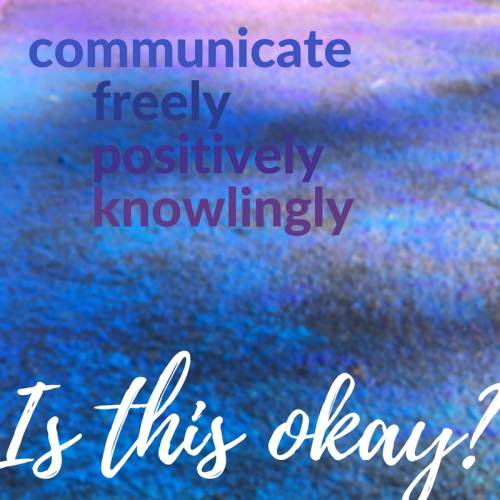Consent: Everybody Wins
Joining the conversations about sexual assault and violence
by Abby King-Kaiser

I am the parent of a four-year-old and a seven-year-old. We spend a lot of our time and emotional energy on language. Turns out, this is where, as 1 John 3 puts it, my faith becomes real, as I teach my kids to “love, not in word or speech, but in truth and in action.”
Oh the ironies. It feels ironic. It really does.
John wants us to avoid empty words. I have a charming little one who know EXACTLY when to say “I will love you forever” because it is cute and not because it is sincere. He knows how to use the cute to temper the other emotions of the adults around him, to soften anger or frustration. I am pretty sure this is exactly the kind of love speech John is aiming for us to avoid.
And.
And, communication is a bedrock of real, authentic love, in truth and in action. My kids want to hear they are safe when they also hear a creepy noise at night. Just putting them back in bed won’t do. He does love us, and wants us to hear it. And he wants us to say it to him to constantly remind him where he belongs. So much truth and so much action requires words to get there.
This is why we spend so much time with our children on “please” and “thank you” and other “manners” that are really just social conventions of language. We are teaching our youngest to ask the neighbor kids if he can join them in play. He is much younger than they are, and they are generally gracious about including him. But, it has been a hard road to help him understand that he doesn’t get to just barge in, interrupt their game, and make space for himself among whatever they are doing. It is respectful of them and their dignity; it is also respectful of himself and his own dignity, helping him to see his place in the world as no more and no less than another. Language is the tool and sometimes the frame for these kinds of big lessons about personhood, community, and relationship that he is learning and we are teaching. And it is hard. And relentless. And frustrating. And at the core of what I have come to believe about the dignity and worth of each and every person created by God. My kids are a good place to start with passing these values on.
People hear consent related to sexual assault, rape, Title IX, sexual harassment, and #metoo. We decode and overthink second or third hand reports of language used in certain situations endlessly in online conversations. We bemoan the over reliance on politically correct language and I know many people feel like conversations of consent simply bring this awful culture into intimate spaces where it doesn’t need to be.
And yet, if we teach our kids to ask before joining a game to respect the other people they are building relationships, how can we do anything other than teach them to ask before giving a hug, a kiss, or more?
I thought I would hate my first clergy sexual ethics training. Who wants to talk about sex with their colleagues, some of whom could be my grandparents? I had moved from the Midwest—where I had never been a very cuddly or touchy person with the people around me—to the West Coast, a place full of huggers (who knew?). Suddenly, in seminary, in the church I served, people who I barely knew wanted a hug. People—I barely hug my dad! And somehow, in embrace after embrace, I felt uncomfortable with no tools to deal with it. So, this training surprised me with tools, phrases, words, a framework, to help me understand my own boundaries, my ability to ask people to respect them AND my own ability to give and discern what others needed. Now, rather than awkwardly wonder if that crying person wants a hug, and standing awkwardly in the silence of unknowing as the social gap seems to grow wider and wider, I just ask, “do you want a hug?” I ask to respect the other person’s dignity AND my own. Because, if in fact, a hug is the very thing the crying student in front of me needs, I can get around my own comfort level to give that. If it isn’t, and it will only make their suffering worse, now I know, without giving too much of myself in the process.
Starting to see the “church hug” as an issue of consent, dignity, and respect started to help me to see how positively consent could contribute to the challenge of human relationships. So much of our conflict comes from not knowing—not knowing what others want or need, making assumptions about what is actually happening, or sometimes outright refusal to see a perspective other than our own. Consent invites us to ask questions, to better know the people around us, to better understand the relationships we are forming, and to see the other as fully-embodied and dignified by their belovedness before God as we are.
Questions invite the person speaking into deeper listening, into more fully understanding the person or people they are with. Questions give space for someone to take the invitation to share who they are, what they need, or a piece of their story. Well-placed questions build trust. Well-asked questions deepen our curiosity and compassion for others. Well-placed questions deepen relationships and bond us ever closer together, in a way that is faithful to the Gospel vision of personhood, relationship, love and community.
Consent is not just about sexual harassment or sexual assault, or even just about intimate acts behind closed doors. Consent is also about building healthy relationships that truly respect the God-given dignity and worth of each and every person, whether 3 or 93.
So what is consent?
Many organizations who work on sexual ethics have done a better job than I can do here: RAINN’s definition, Love is Respect’s information (a project of the National Domestic Violence Hotline). You can also find definitions of consent on most university websites.
My favorite example, it is like tea. Here is a fun little primer on consent from Emmeline May and Blue Seat Studios.
How might this conversation help us in the church? There are so many places where consent can help us be ever more faithful in our work. What about the consent of the communities we serve in? Have we asked if, in fact, a community we “serve” wants our church to come in? In the middle of a project, do we listen if a community is unhappy with what we have done? How do we treat our children and our elders? Do we ask for their preferences about touch and affection? Or, do we assume that great-Auntie Marge who taught us Sunday school three decades ago would love a hug even though physical touch causes her bodily pain? Do we hug our female pastors but shake the hands of our male pastors?
All of these are for me, about the substance, in truth and in action, or our love and faith. Consent challenges us to thoroughly follow through on the invitation in first John. What questions should you ask? And what groups in your church should be asking them?
Abby King-Kaiser is the associate director for at the Dorothy Day Center for Faith and Justice at Xavier University, where she helped to  found Common Ground, a new worshiping community on campus. A pastor, a painter, a hometown girl who loves to travel the world, she is a coffee & instagram junkie (and a mother of two).
found Common Ground, a new worshiping community on campus. A pastor, a painter, a hometown girl who loves to travel the world, she is a coffee & instagram junkie (and a mother of two).